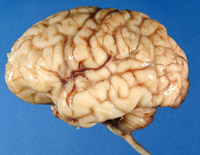Men are smarter than women, study says
Men are smarter than women, according to a controversial new study that adds another cinder to the fiery debate over whether gender impacts general intelligence.

"For 100 years there's been a consensus among psychologists that there is no sex difference in intelligence," said J. Philippe Rushton, a psychologist at the University of Western Ontario, Canada.
Recent studies, however, have raised questions about the validity of this claim, he said. One such study showed that men have larger brains than women, a 100 gram difference after correcting for body size.
To determine if there was a link between gender and intelligence, and perhaps between brain size and intelligence, Rushton and a colleague analyzed the Scholastic Aptitude Test (SAT) scores from 100,000 17- and 18-year-olds.
When Rushton and colleagues weighted each SAT question by an established general intelligence factor called the g-factor, they discovered that males surpassed females by an average of 3.6 IQ points.
The g-factor works like this. "If I tell you the last four digits of my telephone number and ask you to repeat them back to me, that's a low g-loaded memory test," Rushton explained. "But if I then ask you to repeat them back to me in the reverse order, that suddenly requires a tremendous amount more cognitive processing. It is a very high loaded g-item.”
So the g-factor "is really the active ingredient of the test," Rushton said. "It's the single best, most predictive part of the test."
Rushton suspects that the results are due to males having more brain tissue than females on average. "It's a very reasonable hypothesis that you just need more brain tissue dedicated to processing high ‘g' information," Rushton said.
The study, which Rushton co-wrote with Douglas Jackson, also of the University of Western Ontario , is detailed in the current issue of the journal Intelligence.
The debate goes on
The findings add fuel to a still smoldering debate ignited by former Harvard President Lawrence Summers, who stated early last year that males have a higher intrinsic aptitude in science and engineering.
In a letter from Summers days after his controversial statements, he wrote: "Despite reports to the contrary, I did not say, and I do not believe, that girls are intellectually less able than boys, or that women lack the ability to succeed at the highest levels of science. As the careers of a great many distinguished women scientists make plain, the human potential to excel in science is not somehow the province of one gender or another.”
While Rushton called his results significant, he doesn't think they are a basis for uprooting the field of education.
"I don't think it has any real implications for education policy or schoolwork," he said. "In fact, females actually get better grades than males.”
Plus, he doesn't think the IQ difference would show up in everyday activities. "For the vast majority of people in the vast majority of jobs, it really doesn't translate into very much," he said.
But when it comes to Nobel Prize winners, he said that men could outnumber women 10-to-1. "Where it will really show up is at the very high end of the distribution," Rushton said.
Rushton has left the door open for opposing views and findings that might contradict his new study.
Source: livescience.com
Prepared by Alexander Timoshik
Pravda.ru
Subscribe to Pravda.Ru Telegram channel, Facebook, RSS!


